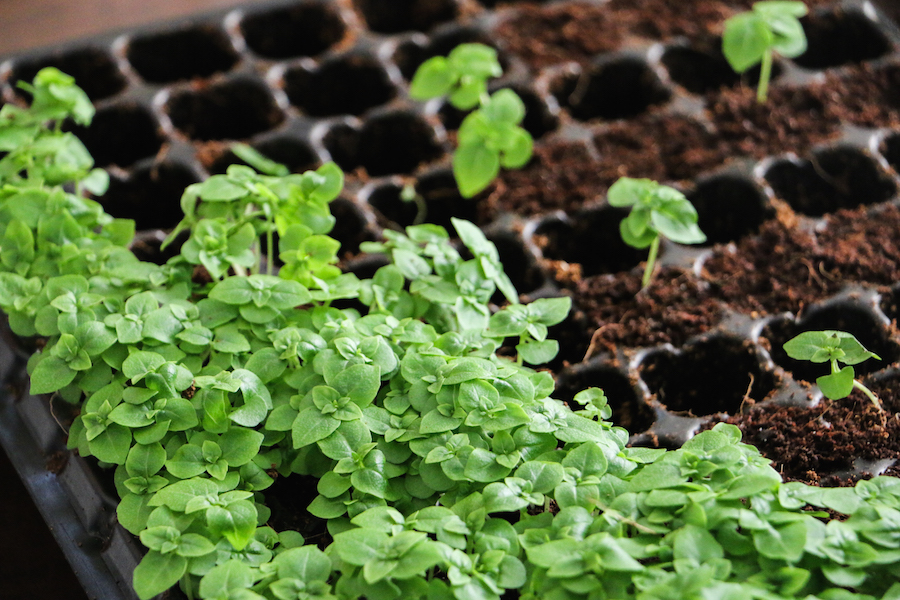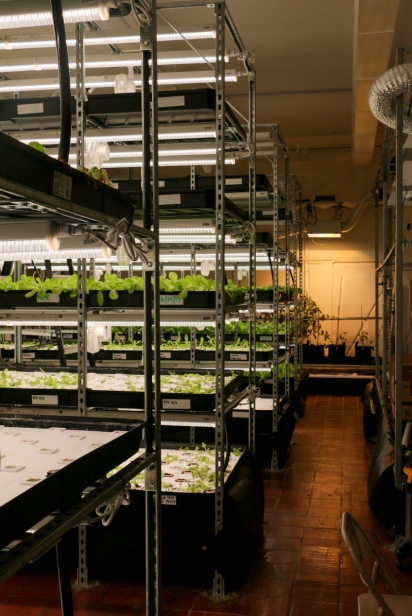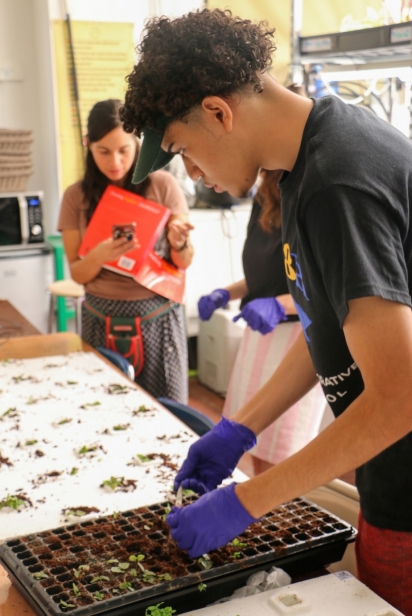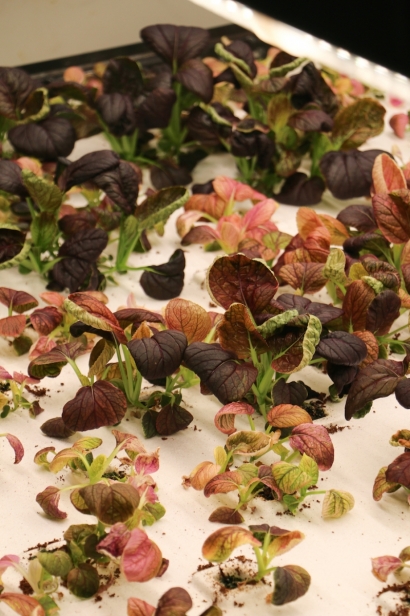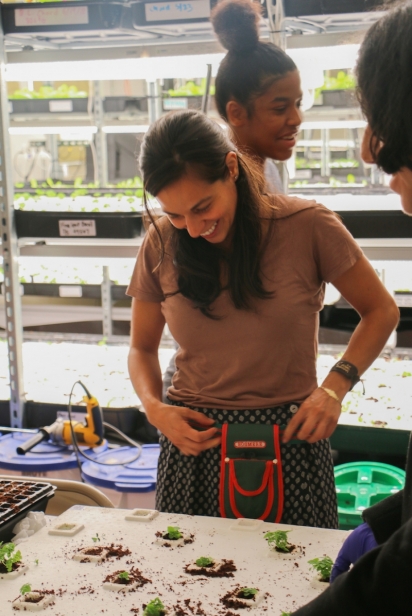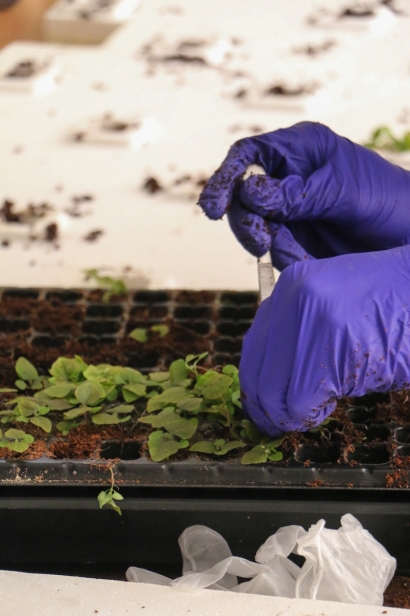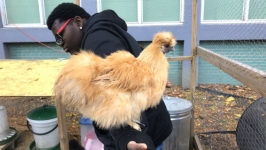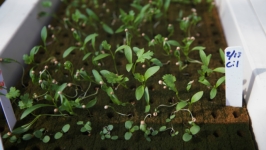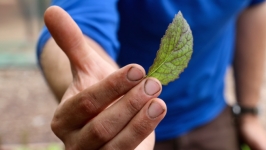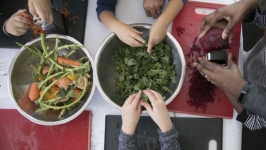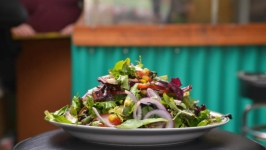A Student-Built Hydroponic Farm Grows Inside This Bronx High School
There’s lettuce growing inside one of the science classrooms on the DeWitt Clinton High School campus. Rows of it, along with Swiss chard, bok choy, tomatoes, cucumbers and herbs including basil, thyme, oregano and cilantro. Shelves of produce in various stages of growth fill two-thirds of Room 332, with a couple of communal tables and chairs tucked in the remaining space. The hydroponic farm is so much cooler than any science classroom of my high school days.
Students from DeWitt Clinton spent most of the 2017–18 fall semester building the farm, which uses water and a nutrient solution but no soil. At 1,300 square feet, the Teens for Food Justice/Sun Club Farm is New York City’s biggest student-built indoor, vertical hydroponic farm. This year students will use it to grow an estimated 25,000 pounds of produce throughout the year. Some of that produce will show up at the salad bar in the school cafeteria; another 30–60 pounds per week will be donated to local food pantries through City Harvest; and some will be sold by students at a weekly farmers market.
“I would pass by the classroom on my way to lunch or gym and I was curious about it, but also skeptical,” says Natalya Wittingham. The recent high school graduate took part in a summer program at the farm. “It was more fun than I thought it would be. I liked seeing how you seed and how you water the plants. I had no idea a substitution for soil could be a coconut husk.”
Coconut husk or coco coir is the hulled fiber that comes from the middle layer of coconut fruit. Traditionally, the long fibers have been used to create textiles such as mats or ropes while the smaller fibers were often trashed. For the past 30 years those smaller fibers have been used as an alternative to soil and are even available at Home Depot and other garden supply stores. At the Teens for Food Justice/Sun Club Farm students prepare to put seeds into the husk where the plants will then take root. It’s just one of the high-tech farming skills students are learning. They began growing produce at the farm in January. During the summer program students rotated through different experiences including working at the outdoor community garden and inside at the farm, as well as taking workshops on health and nutrition, food justice and food access.
“It’s unusual for kids to have this kind of hands-on learning in their daily life,” said Katherine Soll, CEO and director of Teens for Food Justice (TFFJ), the nonprofit that helped the students build the hydroponic farm with funding help from various donors including the Green Mountain Energy Sun Club and Councilman Andrew Cohen.
The farm is the fourth one in NYC that TFFJ has worked with schools to create as part of their mission to teach students about urban and sustainable agriculture and health and nutrition while providing urban youngsters with entrepreneurship, science, technology, engineering and math skills and working to solve food insecurity. All of the schools TFFJ works with are Title I schools, meaning a high percentage of students are eligible for free or reduced lunch as determined by the federal government.
“We see a quick and direct influence on the students,” Soll said. “They consume the produce every week, see it on the salad bar and it makes an impact on the community as a whole by giving students more of an awareness of where there is a lack of food access.”
At the DeWitt Clinton High School campus, in addition to the roughly 2,200 students who will see the food on their lunch trays about 150 students throughout the school year will work directly at the farm through environmental sciences programs at World View, Bronx Collaborative and DW Clinton High Schools, all of which share the same school campus and during additional after-school and summer programs that will also focus on food justice, business skills and health and nutrition.
One of the beauties of the farm is the experiments the students get to do. This past summer they were figuring out the best way to grow tomatoes at the farm. By blocking almost all the natural sunlight out of the former chemistry lab the students were able to control and monitor the amount of light supplied by LED bulbs. A recirculating water and nutrient system delivers sustenance to the plants while teaching the students about sustainable farming. According to TFFJ, the hydroponic farm significantly reduces water consumption. For instance, a head of lettuce grown at the vertical hydroponic farm uses just one quart of water compared to more than four gallons per head with conventional farming. But while students learn about the benefits of hydroponic farming—it takes up less space, avoids the uses of pesticides and cuts down food miles—they also learn about some of the cons, such as not using natural sunlight or soil.
“That you can do all of this indoors, it’s amazing,” says recent graduate high school graduate Justin Roman, who participated in the Teens for Food Justice/Sun Club Farm during the 2017–18 school year and during the summer. Roman, who is attending Bronx Community College this fall, will be taking many of the skills he learned at the farm into college and eventually, he hopes, into his career.
“I want to go into the culinary industry,” Roman says.
The students handle everything from seeding to harvesting to distribution. You can taste some of their work yourself. Every Friday from 11:30 a.m. to 2:30 p.m., they’ll be selling some of the produce they grow at a weekly farmers market along with produce from the on-site garden.


